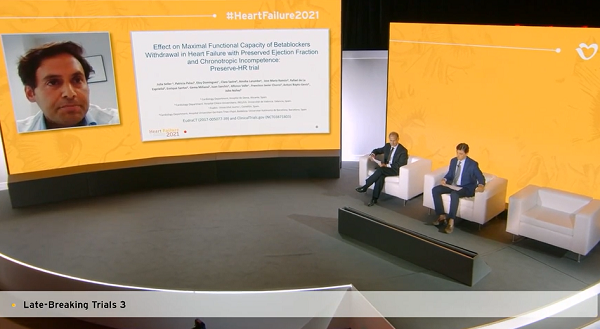Beta-blocker Withdrawal Boosts Peak VO2 in HFpEF Subset: PRESERVE-HR
A small trial is the latest to hint that a drug common in HFpEF may not help, notably if chronotropic incompetence is present.

A small randomized trial is once again raising questions about the use of beta-blockers in patients with heart failure and preserved ejection fraction (HFpEF), this time zeroing in on patients who also have chronotropic incompetence.
HFpEF is a heterogeneous syndrome, stressed Julio Núñez, MD (Hospital Clínico Universitario, INCLIVA, Valencia, Spain), who presented the results at the virtual European Society of Cardiology (ESC) 2021 Heart Failure Congress last week. “This is not one disease,” he told TCTMD. “And currently we don't have a well-known, well-recognized treatment for these patients. Physicians who treat these patients try to do the best for the patient, but most of them think that if you prescribe beta-blockers in these patients you are doing well because most of these patients have AF [atrial fibrillation] or ischemic heart disease.”
Indeed, most HFpEF patients are prescribed beta-blockers, he noted during his talk, pointing to TOPCAT and PARAGON-HF, both HFpEF trials, in which more than 75% of patients were also treated with beta-blockers. “But we don't have robust evidence provided by clinical trials endorsing the clinical utility of these drugs in patients with HFpEF,” Núñez said.
PRESERVE-HR
For the PRESERVE-HR study, investigators screened 250 patients with HFpEF (LVEF ≥ 50% and NT-proBNP > 125 pg/mL) who’d been taking a beta-blocker in recent months, eliminating any who did not also meet criteria for chronotropic incompetence—defined as the inability to reach expected heart rate levels in response to exercise—on cardiopulmonary exercise testing (CPET). Ultimately, a total of 52 patients were randomized to have their beta-blockers discontinued or maintained over 15 days, and then crossed over to either withdrawal or continuation thereafter.
Both peak VO2 and percent predicted VO2 were significantly increased following beta-blocker withdrawal, a pattern that was seen across a range of subgroups stratified by age, sex, history of ischemic heart disease, and presence or absence of AF. Minnesota Living with Heart Failure Questionnaire (MLHFQ) scores fell, indicating less impairment, from approximately 28 in patients maintained on beta-blockers to approximately 22 in patients who had them withdrawn (P = 0.0236).
The study is too small to draw major conclusions from the subgroup analyses, Núñez cautioned, but the direction of the results remained consistent across all groups studied.
“In other words, after stopping beta-blockers, patients improved their tolerance to exercise and as a secondary endpoint, we also found improvements in quality of life as assessed by the MLHFQ,” he said.
It will be important to look at the longer-term effects of stopping beta-blockers and, importantly, whether the changes in VO2 max have an impact on hard events. But even at 15 days, said Núñez, results were “clinically meaningful” in this blinded trial. Not only did patients feel better in as little as 3 to 5 days after beta-blockers were stopped, but also the change in percent predicted peak VO2 was 12% when the drugs were withdrawn—roughly double the amount deemed clinically relevant in consensus documents, he explained.
If confirmed in larger trials, with harder endpoints, the finding would be important for HFpEF patients.
“In general, patients do not like beta-blockers, especially young people,” he told TCTMD, citing “important” side effects. In patients with heart failure and reduced ejection fraction (HFrEF), these adverse effects are clearly offset by the benefits of reduced mortality, sudden death, and readmissions, Núñez stressed. “But in HFpEF, we don't have any evidence to support that treatment in these patients. Most of the indications are based on the treatment of high rate response in patients with AF, but in a patient with sinus rhythm and normal heart rate, or even in a patient with AF and normal heart rate, they are not indicated. But most [doctors] traditionally think that if we treat these patients with beta-blocker, we may obtain some clinical benefits. We are learning that broadly we may be doing harm.”
We are learning that broadly we may be doing harm. Julio Núñez
During the discussion following Núñez’s presentation, moderator Massimo Piepoli, MD, PhD (Guglielmo da Saliceto Polichirurgico Hospital, Piacenza, Italy), called the findings “stimulating and practical” but noted that the findings are “not unexpected,” given that beta-blockers lower heart rate. As such, withdrawing them would inevitably lead to higher cardiac output and stroke volume. What’s not clear, however, is whether the same findings would be seen in patients whose exercise capacity was more depressed.
In response, Núñez noted that the CPET screening used to look for chronotropic incompetence at baseline excluded a large number of patients with more compromised exercise capacity, in whom the benefit of beta-blocker withdrawal remains unclear. But after reviewing the PRESERVE-HR results, Núñez says that, in his clinic, when they see patients with chronotropic incompetence and a heart rate in the range of 60 to 65 bpm with important functional limitations, they test the possibility of down-titrating or even withdrawing beta-blocker therapy. The researchers hope to move ahead with a larger trial using harder clinical endpoints, he added, to verify both safety and efficacy.
There is a reassuring signal in this small study, however, that the increased heart rate is not putting undue stress on the heart, observed session co-moderator Carlo Gabriele Tocchetti, MD, PhD (Federico II University, Naples, Italy). “One thing that struck me in a positive way was that even though you shortened the diastolic phase, because you are removing the beta-blockers, your NT-proBNP did not really worsen, so your filling pressures stayed the same,” he said. “You increased oxygen consumption, but filling pressures stayed the same.”
To TCTMD, Núñez reiterated that 250 patients in PRESERVE-HR were screened but just 52 were found to have chronotropic incompetence; prior studies have suggested that anywhere from 30% to 70% of HFpEF patients also have chronotropic incompetence, but the true percentage is not known.
Commenting for TCTMD, Javed Butler, MD (University of Mississippi Medical Center, Jackson), believes the number is closer to one in five HFpEF patients, leaving the door open for beta-blockers to be of benefit in the broader group. Another issue, he added, is whether withdrawal would be the best solution in these patients, or if lower doses might be the better strategy. Overall, he said, this study, was “well done” and based on a good rationale, with important results worth studying in a larger trial.
Shelley Wood was the Editor-in-Chief of TCTMD and the Editorial Director at the Cardiovascular Research Foundation (CRF) from October 2015…
Read Full BioSources
Núñez J. Effect on maximal functional capacity of betablockers withdrawal in heart failure with preserved ejection fraction and chronotropic incompetence: PRESERVE-HR trial. Presented at: ESC-HF. July 1, 2021.
Disclosures
- Núñez reports research grants, speaker fees, and/or advisory board fees from AstraZeneca, Novartis, Vifor Pharma, Boehringer Ingelheim, Novo Nordisk, Rovi, Bayer, and Pfizer.





Comments